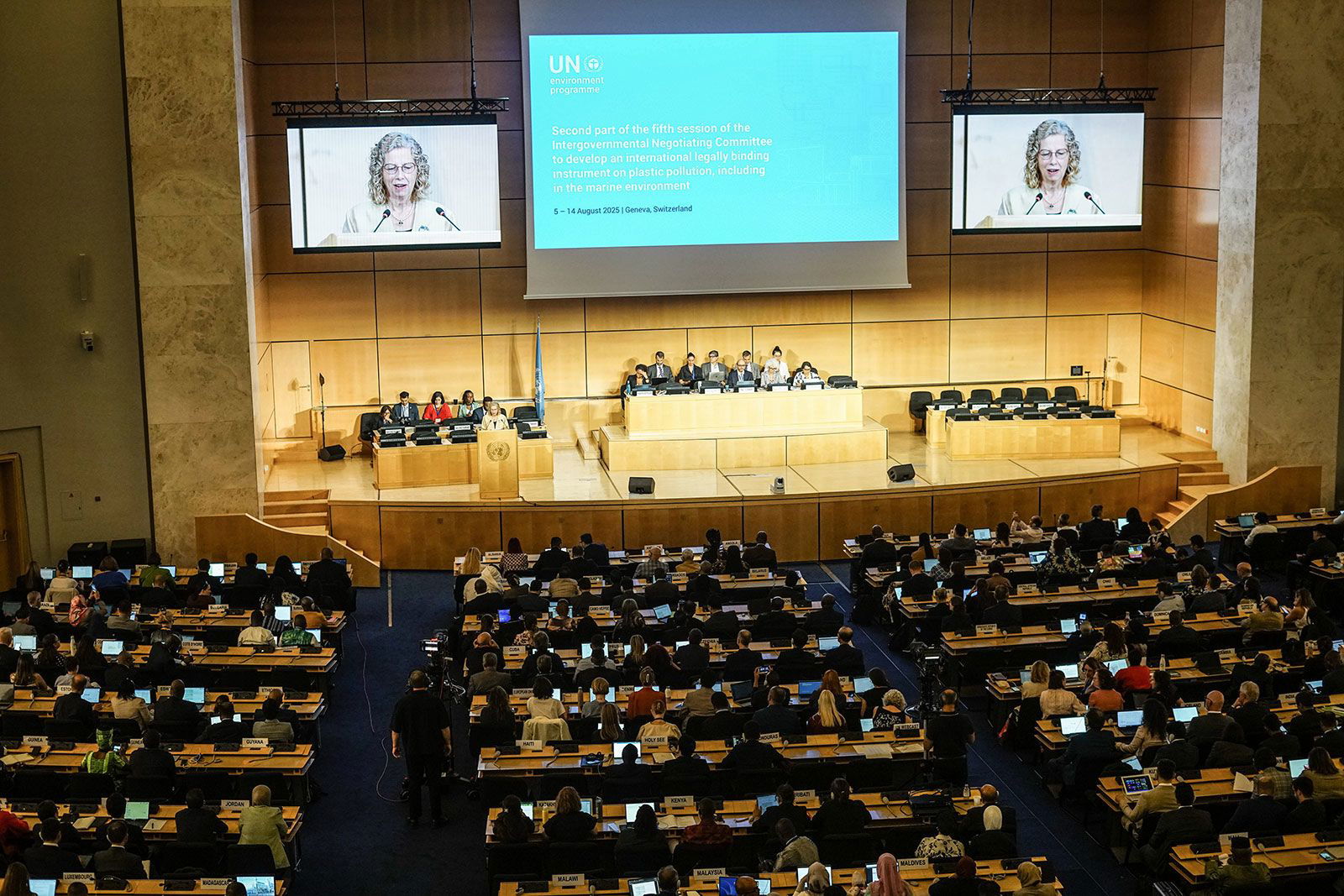Global plastic treaty talks end in failure as countries remain bitterly divided over how to tackle the crisis

An artwork by Canadian artist
By Laura Paddison, CNN
(CNN) — Talks to finalize the world’s first treaty on plastic pollution in Geneva, Switzerland collapsed in failure Friday as countries remained bitterly divided how to tackle the crisis.
The summit, held at the United Nations headquarters and attended by delegates from more than 180 countries, was supposed to end Thursday after 10 days of contentious talks, but slipped into overtime as nations were unable to break their deadlock.
More than 100 countries had called for legally binding caps on plastic production. Many also demanded action to tackle toxic chemicals in plastics.
But powerful oil and gas producing countries such as Saudi Arabia and Russia pushed back strongly arguing the treaty should focus more on recycling, reuse and redesign than production caps or a phase-out of chemicals.
The chair of the negotiating committee presented a draft of the treaty in the early hours of the morning local time on Friday, but delegates did not agree to use it as basis for further discussions — leaving no path forward.
The committee has said negotiations will continue at a future date, but there are deep uncertainties about when and what form these will take.
“By missing yet another deadline to confront the escalating plastic pollution crisis, states are putting the health of people and the planet at risk,” said Sarah Baulch, a senior officer at the Pew Charitable Trusts.
Countries agreed to negotiate a legally-binding plastics treaty back in 2022, with the aim of tackling the full lifecycle of plastic: from how it’s made to what happens when it’s thrown away.
The Geneva negotiations marked the sixth round of discussions. The process was supposed to conclude in South Korea in December, but talks fell apart mostly over the issue of production cuts.
Plastic production has soared over the past few decades, especially single-use plastics. Around 460 million metric tons are made each year and levels could soar 70% by 2040 without stronger policies, according to the Organization for Economic Co-operation and Development.
Only a tiny fraction of plastic is recycled, less than 10% globally, the rest ends up incinerated, in landfill, or choking the world’s rivers and oceans, killing marine life.
As plastic degrades, it breaks down into microplastics, tiny pieces no bigger than 5 millimeters. These are found everywhere: the air we breathe, the water we drink, in our noses, brains, even testicles.
A slew of scientific research shows exposure to plastics affects humans throughout their whole lifespans, from the womb to old age. Toxic chemicals in plastics have been linked to a vast range of negative impacts, including obesity, heart disease, cancer, asthma and reproductive problems.
Plastics aren’t just a health and environmental issue; they are also a huge climate problem. The vast majority are made with fossil fuels, and produce planet-heating pollution throughout their lives — from production to disposal.
Despite wide agreement on the need to deal with the plastics crisis there has been huge division over how. The main points of contention have been whether the treaty should tackle plastic production at source, and place limits on the amount of new plastic churned out.
Many petro-chemical producing nations and companies see plastics as vital to their economies and bottom lines, especially as the world moves away from fossil fuel energy and toward renewables. They point to the vital role plastics play in society — from medical instruments to food packaging — and have pushed for action to focus on its end of life.
Marco Mensink of the International Council of Chemical Associations said manufacturers remained “committed to supporting a treaty that keeps plastics in the economy and out of the environment by advancing a circular economy — designing products for reuse and recycling, collecting them at end of life, and remaking them into new products.”
But many countries and campaigners say the crisis cannot be solved without addressing exponential increases in plastics consumption, and that recycling rates have remained stubbornly low for decades.
Representatives from a broad range of countries said they were deeply disappointed to be leaving Geneva without a treaty, according to an Associated Press report.
Some campaigners blamed fossil fuel lobbying for the talks’ failure. “The vast majority of governments want a strong agreement, yet a handful of bad actors were allowed to use the process to drive such ambition into the ground,” said Graham Forbes, global plastics campaign lead for Greenpeace USA.
Erin Simon, head of plastic waste and business at environmental non-profit WWF said it was “deeply disappointing” to leave Geneva without meaningful progress.
“This breakdown in negotiations means the plastic crisis will continue unchecked, while the world waits for the urgent action it so desperately needs.”
The-CNN-Wire
™ & © 2025 Cable News Network, Inc., a Warner Bros. Discovery Company. All rights reserved.



